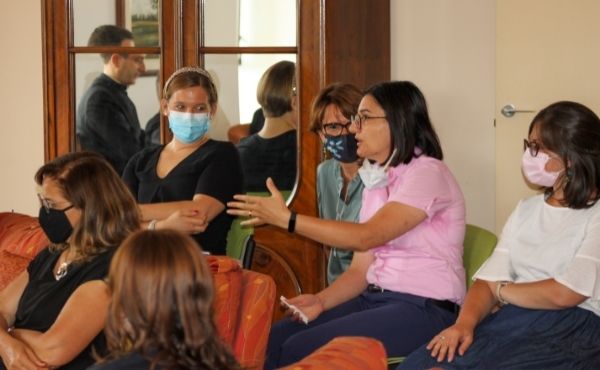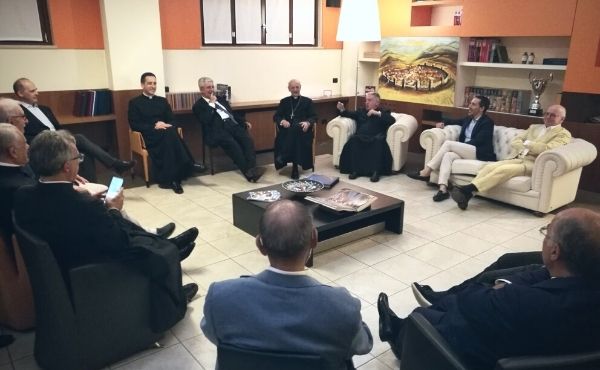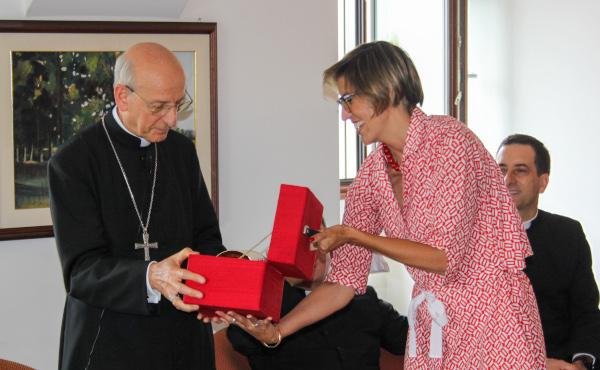“For the faithful of the Work,” the Prelate said, “the most important thing is their relationship with Christ and their concern for others. For this, we need formation and humility to be able to open our heart to God’s Love.” Being close to Christ will lead us, he continued, to not settle for “taking refuge” in a Christian environment, but rather “to want to carry out an authentic apostolate ad gentes, that is, bringing the Word closer to everyone.” This is what the first Christians did with the Gentiles, with those who didn’t believe, in the first centuries.
Angela told the Prelate about her work as a member of the police force in welcoming immigrants in Lampedusa and Syracuse. On the Italian shores she has come into contact with the suffering of many refugees, and has had the opportunity to help them both physically and spiritually, praying for them and their future. Angela has also organized classes of Christian and spiritual formation for her colleagues in Syracuse.

Sara spoke about the volunteer activities she carries out with young students and how the effort to assist others has led many of the girls to talk with our Lord about how to respond to the mission that each and every one receives from God.
In meetings with small groups of people, the Prelate heard stories about the region of Italy most affected by the pandemic. For example, Piergiorgio told him that his elderly aunt was very happy because she had been able to speak with a priest and receive the sacraments after months of being confined in a residence.

When asked about the upcoming centenary of Opus Dei, in 2028, Monsignor Ocáriz said that “an institution in the Church that is turning one hundred is still just beginning. We are certain that Opus Dei does not have to be reinvented, but we need to live the spirit Saint Josemaría passed on to us as if it were new each day, so that the gift God has given us will bear fruit.” He also encouraged everyone to prepare personally for the centenary in their own hearts, by offering our Lord a fidelity that is more mature each day.
Before continuing on his return trip to Spain, Monsignor Ocáriz said that “although we say goodbye, in the communion of saints we always remain closely united. We are never separated from one another.”
In Budapest, Zagreb and Ljubljana (3-5 August)
Monsignor Fernando Ocáriz was in Budapest (Hungary) on August 3. There he met with people of Opus Dei and their families. “Dream and your dreams will fall short,” he said with words of Saint Josemaría. “Christians have the mission to bring the world to God. It may hurt us to see that the world is so far from Him, but his apparent absence should spur us to a more intense apostolate.”
In his get-togethers with faithful of Opus Dei, the Prelate invited them “to be open to everyone, and to form friendships with the people around us.” Christians bring God to others when “they do everything with Him, in his presence.” And when things “seem more difficult or we experience our weakness more clearly, we need to remember that what never changes is God’s Love for us, which is the deep source of our optimism and joy.”
After his brief visit to Budapest, the Prelate of Opus Dei traveled to Zagreb and Ljubljana. In the first city, the capital of Croatia, Monsignor Ocáriz stressed the importance of friendship. “When friendship is real and deep, it is the form of love by which we can share with others what we carry in our hearts. God invites all of us to cooperate with Him so that his Word may reach everyone. Two friends don’t just exchange impressions about society, the world, or their own profession. When there is true friendship, there is also a spiritual harmony,” he said.
In one of the get-togethers, Blaženko told the Prelate that the day before he had asked to be admitted to Opus Dei, so he needed advice on taking his first steps on that path in the Church. “Saint Josemaría would tell you that the Work is already your responsibility. It depends on your prayer, on your work... All of us in Opus Dei form part of the Mystical Body of Christ, and therefore thanks to the communion of saints we all support the Work with Him. Make good use of the means of Christian formation, in order to get to know each day better the faith and your vocation.”
Ksenija, in turn, asked for advice on how to rest in God, so as not to be overwhelmed by what happens around us: “Two fundamental points in order to rest in God, to regain our joy and to give ourselves to others are the Eucharist and prayer. These moments are the source of true peace, true security and true joy.”
On Thursday afternoon, the 5th of August, he arrived in the capital of Slovenia. In Vintgar, a residence for university students, he had a gathering with various families. The Prelate of Opus Dei stressed the need to pray for people one by one in their prayer, in order to learn to love others more and better. “Ask our Lord to give you a heart like His, so that each day we bring his Love to everyone.”
Cecilia told him that she likes to chat with her friends about many topics, but that it is often difficult to talk about faith and the spiritual life with them. “We can’t expect a friend to open her inner world to us if we don’t open ours to her, because that is the nature of friendship. Friendship requires sincerity, interest and affection for the other person, and therefore it takes time and perseverance, because it is not always easy to make friends.”
Kati mentioned that Slovenia is celebrating the thirtieth anniversary of its independence. The Prelate invited everyone to look to the future with great hope: “The future is in your hands. Put your hope in God, who continually upholds us.”
In Austria: “To be apostles is to love people” (30 July-3 August)
The Prelate of Opus Dei encouraged the people he met with in Vienna to trust in God: “We have the security that the impossible is possible, because we never lack God’s grace. That each of us is called to be a saint? It could seem impossible to us! But we realize that this doesn’t depend only on our own strength, on our effort, but above all on the grace of God, who is the one who calls us.”
He reminded them that Saint Josemaría was only twenty-six years old when he founded Opus Dei; he had no means himself and the society around him was divided. Almost a hundred years later, this invitation has reached many thousands of men and women who want to discover their vocation as Christians in the middle of the world.
In many countries “people live in a post-Christian society, but that is no reason to become discouraged,” he said. “There are many good people in the world who are waiting to come to know God, a God who loves us, helps us and strengthens us.” At the same time he also reminded them that “God wants our love,” and therefore prayer will always be one of the foundations of our spiritual life.
“We cannot truly love God if we do not love our neighbor,” he continued. Love is also the driving force to bring the faith to those around us, “never speaking down to them but face to face, as someone who is on their own level. Apostolic zeal doesn’t mean trying to 'convince' others of something, or to impose our own ideas on them. To be apostles is to love people."
Other topics discussed in this encounter were: the Christian education of children, the dedication of parents both to their family and to an intense professional life, Christian apostolate in a post-Christian society, prayer for the Church and the Pope, contemplation amid the noise of daily activities, knowing how to accept the vocation of one’s children, and joy as the sign of a Christian.
Bernhard told the Prelate that sometimes it is painful to see that one's children, when they grow up and after receiving a Christian education, don’t want to know anything about the faith and live far from the Church. “Pray always for your children,” Monsignor Ocáriz said, “also when they grow up and leave home. Be friends with them. All your prayers for your children will bear fruit; nothing is lost.”
Petra asked him about caring for those who are sick. “The Prelate told me that a sick person shouldn’t see himself as a burden on others, but rather as a gift. For those who take care of him, it is a gift to be at the sick person’s disposal and to serve him.”
During his stay in Vienna, the Prelate prayed before the icon of Our Lady of Mariapócs in the Cathedral, before which Saint Josemaría also prayed. On August 3, he continued his journey in the direction of Budapest and Zagreb.
In Zurich: “Everything can be an opportunity to find Jesus” (27-30 July)
During his pastoral visit to Zurich, Monsignor Ocáriz focused his message on three topics: the family spirit in the Work, prayer and joy. He also asked people to pray diligently for the Pope and the Church.
The vocation to Opus Dei, he said, is “an all-encompassing mission that entails the responsibility to always be apostles -- at work, when resting, in one’s family, at the university...” For the faithful of the Work, “the whole day is Opus Dei,” since by offering the events of each day to God “everything is an opportunity to find Jesus and everything can be transformed into prayer.”
Those taking part in the various get-togethers were mainly married faithful and cooperators, who shared with Monsignor Ocáriz their joys and also their setbacks, especially during the pandemic, including sickness and complicated family situations.
The Prelate stressed the need for every circumstance in our life to be “permeated with joy,” also when we face difficulties. “Our faith enables us to be happy no matter what happens,” because of God’s love for us. Furthermore, it “helps us to give ourselves to others and forget about ourselves.”
In one of the get-togethers Sara, who is 29-years-old, said that she had just returned to Lugano, her hometown, from Madrid, where she met and found her vocation to Opus Dei. She asked how she could always stay close to our Lord and to her family in an environment where people don’t have much faith. He encouraged her to seek out God’s presence especially in the Eucharist and in prayer, where we find the strength needed to face difficulties also in challenging settings.
Galà, a Russian woman living in Zurich, told the Prelate that she is trying to bring her friends closer to the faith. ”Every Christian has the mission to help people open their hearts to God, by strengthening ties of friendship and truly listening to each one.” He also encouraged her to strengthen her life of prayer, which “is the main means of apostolate.”
A cooperator of Opus Dei gave the Prelate a sack of flour from the mill run by her son, who provides flour to produce the hosts used in some churches in Switzerland and in the centers of the Work.
Monsignor Ocáriz also had the opportunity to greet some sick people and spoke by videoconference with a woman who was turning 91, asking her to pray for Pope Francis and for the fruit of his pastoral trip. He also prayed for a few moments at the grave of Toni Zweifel, a Swiss engineer who died with a reputation for holiness.
In Barcelona: "A smile on the face brings joy to the soul" (25-27 July)
Monsignor Fernando Ocáriz is taking advantage of the summer to make several pastoral trips. His first stop was Barcelona. On Monday the 26th, in the morning he visited the Basilica of Our Lady of Mercy – as Saint Josemaría so often did. And in the afternoon he met with two groups of faithful of Opus Dei, while observing all the required health measures.
The rector of the Basilica, Father Fermín Delgado, greeted the Prelate when he arrived. They went together to pray before the statue of Our Lady and before the bas-relief in which Saint Josemaría is depicted as praying at the feet of Our Lady of Mercy.
Monsignor Ocáriz wrote these words in the visitor’s book: “With great joy, I have come to pray to Our Lady of Mercy, uniting myself to Saint Josemaría's prayer and intentions when he was here.”
In the afternoon of Monday July 26, he had two get-togethers with faithful of the prelature, many of them supernumeraries, both men and women. The main topic he spoke about was formation, emphasizing that “we are all always in a time of formation.” And he explained why this is important: “Our formation is aimed at making what Saint Josemaría said an ever clearer reality in our life: that we become Ipse Christus, Christ himself. But Christ, for us, is not only an external model. Rather, since we have the Father and the Holy Spirit within us, the moment will come when we will be Christ himself; we will have the same sentiments as Jesus, the same way of reacting to the circumstances in our own lives.”
Isabel, from Lleida, told him that her husband had died from Covid at the beginning of the pandemic. It happened very rapidly and when everyone was confined, but she felt closely accompanied by the prayers of the faithful of the prelature. Monsignor Ocáriz said that we are called “to be children before God and strong in the face of difficulties. We achieve this by being Eucharistic souls and souls of prayer, and asking for light in spiritual direction to make decisions about our Christian path.”
Elena, a mother of six, asked for advice on raising children in an adverse environment. The Prelate advised her “to strengthen each one's spiritual life and avoid isolating them. The solution is rather to form them more and better. This is achieved by being friends with your children: mothers and fathers, be friends with your children. Educating is not only giving guidelines, but transmitting affection and one's own experience. That's what friendship consists of.”
Paco wanted to know how to always be cheerful. “The source of our joy is in our Lord,” Monsignor Ocáriz reminded them. “Something that might seem small and unimportant, but that is very important, is to smile. A smile on the face brings joy to the soul.”
Inma wanted to know how to encourage more people to collaborate in social impact initiatives. Monsignor Ocáriz stressed the importance of friendship to help people foster great dreams, “especially people who have not had the opportunity to receive Christian formation. You have to offer them an authentic, true friendship, without hurrying. Like plants, souls need time to mature, to grow. You can’t grab hold of a plant that has just sprouted and pull it up to make it grow faster, because you won’t make it grow, but rather kill it. Our affection leads us to be patient. Being patient is a way of loving people.”
Rocío, a mother of three teenage children, asked how to combine successfully all the tasks she has to get to each day. “Our life is not made of watertight compartments: spiritual, professional, family, sports... No. Everything is the same: every moment is the life of Christ in us.”
A father asked what attitude to take when children ask about their own Christian vocation: “First of all, you have to pass on your own experience and share with them the joy of the vocation. Sometimes, when the vocation involves celibacy, fear may arise; but celibacy is not a renunciation, it is a gift of God. The vocation to marriage is also a gift from God, but the best gift for each person is what God asks of each one. Therefore one needs to be open and encourage a sincere and generous discernment.”
At the end of his pastoral visit to Barcelona, the Prelate traveled to Switzerland, where he will have other catechetical get-togethers with people who take part in the means of formation offered by Opus Dei.
